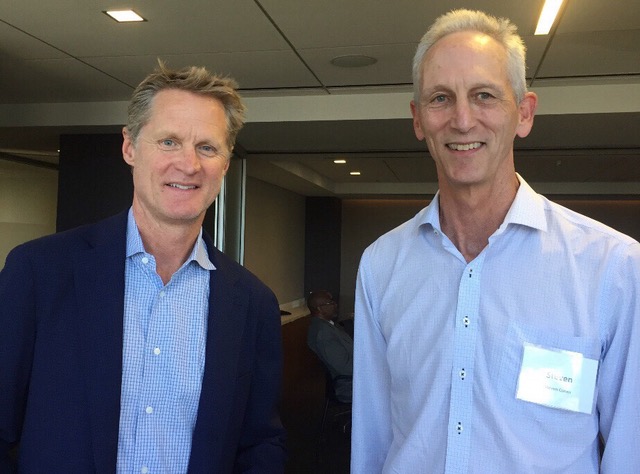The responses below represent the view of our donor, and not necessarily The San Francisco Foundation.
How did you first get involved in philanthropy?
I like to think giving is in my blood through my parents, but I certainly became more serious about philanthropy when my mom—a “philanthro-activist” who started the Ploughshares Fund—passed in 2006. My four siblings and I became officers of her foundation and we transitioned that to a donor advised fund at The San Francisco Foundation (TSFF) in 2010.
How did your giving evolve after that?
Well it got a lot more focused on democracy issues. It seems like ancient history now, but back in 2010 the Citizens United ruling came down and we began witnessing a steady unraveling of basic democratic rights. We were wondering how money became free speech and how corporations came to possess rights. Credit TSFF because in 2011 it hosted a briefing, “A Year After Citizens United v. FEC: What Now?” A bunch of us were heartened to learn from distinguished pollster Peter Hart that ~85% of Americans—both Republicans and Democrats—felt there was too much money in politics. I mean the two parties can’t agree that puppies are cute (except mine, of course).
What do you mean by the unraveling of our democracy?
Where do we start? Well, by the few objective measures and certainly by every other indicator, the U.S. was already a flawed democracy on the world stage. But it’s pretty hard to overlook the voting restrictions and purges, gerrymandering, anti-protest laws, corruption, attacks on the free press and judiciary, foreign interference in our elections, influx of money influencing the courts and elections, not to mention the dark money we don’t even know about. And against that depressing backdrop, only 40 percent of the eligible voting population is expected to exercise their right to vote in the 2018 midterms.
Where are you seeing hope?
California and the Bay Area! In the same 10 years, California has established online voter registration, an independent redistricting commission, pre-registration of teenagers, measures to increase transparency, election cybersecurity, vote centers and other efforts. And then there are a host of local democracy reforms including ranked-choice voting and small donor financing of elections in San Francisco, Berkeley and other cities.
Are there organizations you are passionate about supporting?
Many and each has its own niche. I guess I would say that because we are living in such dangerous times, that the organizations fighting to preserve our core values and institutions in the wake of rising authoritarianism would rise to the top. In that arena, I like Protect Democracy, ACLU and Citizens for Responsibility and Ethics in Washington (CREW).
How has TSFF supported your philanthropy?
TSFF has been supportive from the start. About a year after the foundation hosted the Citizen’s United meeting, Susan Clark from the Columbia Foundation (now the Gaia Fund), and I hatched Bay Area Democracy Funders. Benita Kline from Arkay Foundation was the first to jump on board. We wanted to build a local network with experts, funders and friends to try and identify and amplify the most valuable funding strategies and opportunities to support rebuilding and reinforcing our democracy. In 2012, we started holding meetings that TSFF not only hosted, but helped fill the room. Of course, TSFF has always been available for consulting, too.
When’s the next Bay Area Democracy Funders meeting?
It’s on September 27, 2018 and all are welcome to join. Here is the link for details: State of Democracy: Countering Threats and Advancing Voting Rights in the U.S. and California.


